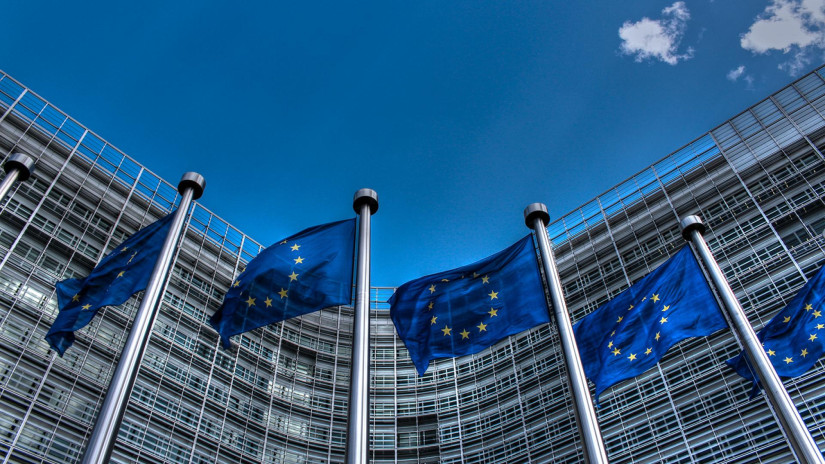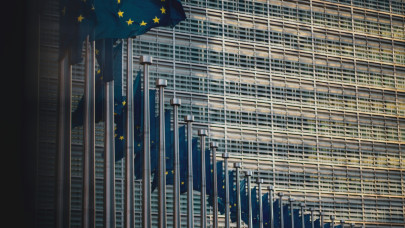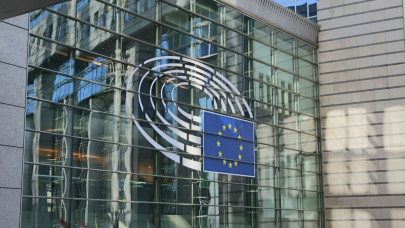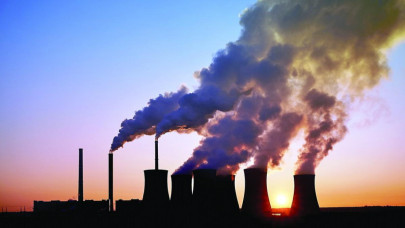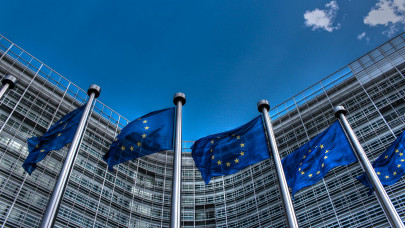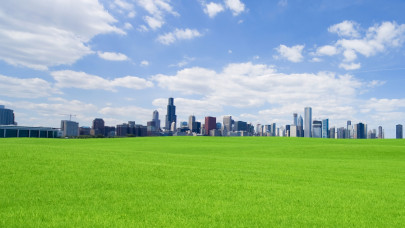The REPowerEU Plan and a series of emergency legislative measures ensured that Europe avoided energy supply disruptions, eased pressure on energy markets, prices, and consumers, and pursued the structural reform of our energy system. This was done through the European Green Deal legislation and through increased deployment of renewable energy and improved energy efficiency. The EU is also on track to deliver on its REPowerEU targets. Ahead of the winter of 2023-2024, the EU is better prepared to ensure its energy security, thanks to well-coordinated actions to fill gas storages, diversify energy import routes and infrastructure, investments in renewable energy and energy efficiency, and collective efforts to reduce energy demand.
The EU's net greenhouse gas emissions decreased by around 3% in 2022, reaching a reduction of 32.5% compared to 1990 levels.
The EU drastically reduced its dependence on Russian fossil fuel: phasing out coal imports; reducing oil imports by 90%; and reducing gas imports from 155 bcm in 2021 to around 80 bcm in 2022 and to an estimated 40-45 bcm in 2023.
The EU reduced gas demand by more than 18% compared with the previous five years, saving around 53 bcm of gas.
Gas storage facilities were filled to 95% of capacity ahead of the winter of 2022-2023 and stand at over 98% full today, ahead of the coming winter.
The EU Energy Platform organized three rounds of joint purchase of gas, collecting 44.75bcm of demand and matching it with 52bcm of supply offers.
2022 was a record year for new solar photovoltaic (PV) capacity (+41 GW), which is 60% more than in 2021 (+26 GW). New onshore and offshore wind capacity was 45% higher than in 2021.
In 2022, 39% of electricity was generated by renewables, and in May wind and solar surpassed fossil fuels for the first time in EU electricity generation.
Legislative targets were agreed for a minimum share of 42.5% of renewable energy in the EU by 2030, and the ambition to reach 45%. Energy efficiency targets were also increased, to reduce final energy consumption by 11.7% by 2030.
”We are living through a period of heavy turbulence, driven by high energy prices and high inflation. Our first concern this year has been the protection of households and businesses across the EU and solidarity with Ukraine. Today's report underlines the effectiveness of our actions to diversify our energy supplies. Joint gas purchasing has played an important role, and can be a model for future collective efforts in the green transition”, says Maroš Šefčovič, Executive Vice-President for European Green Deal, Interinstitutional Relations and Foresight.
While the worst effects of the energy crisis may now be behind us, the Report highlights that there is no room for complacency. The EU needs to continue to ensure affordable, reliable, and accessible energy for households and to enhance the industrial and economic competitiveness of its industry, supporting investments in clean technologies.
”This year's State of the Energy Union Report underlines the commitment and determination shown last year by all Europeans to overcome the energy crisis together. Our actions – as individuals and collectively – helped avoid the worst impact of Putin's war against Ukraine and the weaponization of energy. The findings of the report show that the REPowerEU plan is delivering: Clean energy transition, diversification, and energy efficiency are the answers to increasing our energy security and meeting our Green Deal targets”, says Kadri Simson, Commissioner for Energy.
While gas prices peaked in August 2022 at €294/MWh, they fell to an average of €44/MWh from January to June 2023. Electricity prices peaked at €474/MWh in August 2022 and fell to an average of €107/MWh from January to June 2023. The Commission continues to pay close attention to energy prices for citizens and industry and has published a recommendation on energy poverty and facilitated a joint declaration on enhanced consumer protection among key stakeholders in the energy sector.
”The past years have been incredibly challenging for Europe, but we have not turned away from our firm belief that the European Green Deal is the answer to both our energy security and our climate challenges. At COP28, Europe will have a strong story to tell. We have made progress on emission reductions, renewable energy deployment, and investing in clean mobility. And we have done this while growing our economy and investing in the clean technologies of the future. Going forward, we will also work to phase out, as soon as possible, any fossil fuel subsidy that does not address energy poverty or the just transition”, says Wopke Hoekstra, Commissioner for Climate Action.
With a strong EU legislative framework now largely in place, Member States need to implement their shared commitments, and the National Energy and Climate Plans (NECPs) are a key tool for planning and tracking this process. This year's Report presents the first assessment of the Progress Reports submitted by Member States on their 2019 National Energy and Climate Plans, which is crucial to take stock of where the EU stands in delivering its climate and energy ambitions. The Commission is still waiting for several Member States to submit their updated NECPs to allow a thorough assessment by the end of this year of whether or not we are on track for achieving our revised 2030 targets, and what measures would be needed to address any shortfalls.
Already now, we can see that we need to significantly accelerate our actions. The share of renewable energy in gross final energy consumption reached 21.8% in 2021. With an average yearly increase of 0.67 percentage points since 2010, reaching the new 2030 EU target of 42.5% will require much faster growth in the coming years. Greenhouse gas emissions continue to fall steadily each year, but the pace needs to pick up, and almost triple the annual reductions, to meet our 2030 targets.
The State of the Energy Union Report highlights the importance of boosting the EU's competitiveness and industrial leadership in the new global energy context, and of concluding legislation on the Electricity Market Design, Net-Zero Industry Act, and Critical Raw Materials Act in particular. These proposals will complement the ‘Fit for 55' legislation and support the development of clean energy sources, grids, and stable markets across Europe. The recently launched clean transition dialogues with industry will be an important tool for implementing legislation and identifying and addressing bottlenecks such as investment barriers or skills shortages. The Commission will also work with Member States to pursue the phase-out of fossil fuel subsidies as soon as possible, which remain a major obstacle to the clean energy transition and a drag on our climate objectives.
The State of the Energy Union Report, which is published each year, is structured in three parts in 2023. The first part describes how the high climate and environmental ambitions under the European Green Deal provided the basis for the EU's crisis response strategy and a strategy for growth and competitiveness. The second part analyses the state of play in the implementation of the Energy Union in all its five dimensions based on the Commission's assessment of Member State progress reports on their National Energy and Climate Plans. The last part points to future challenges for the EU energy system and energy policy.
This Report is accompanied by a series of reports and annexes covering different aspects of the energy and climate transition, including an assessment of progress in implementing the National Energy and Climate Plans, the climate action progress report, the annual reports on competitiveness and energy subsidies, and a report on bioenergy sustainability, among others. It also includes a recommendation on energy poverty and a staff working document that was published on 23 October.

